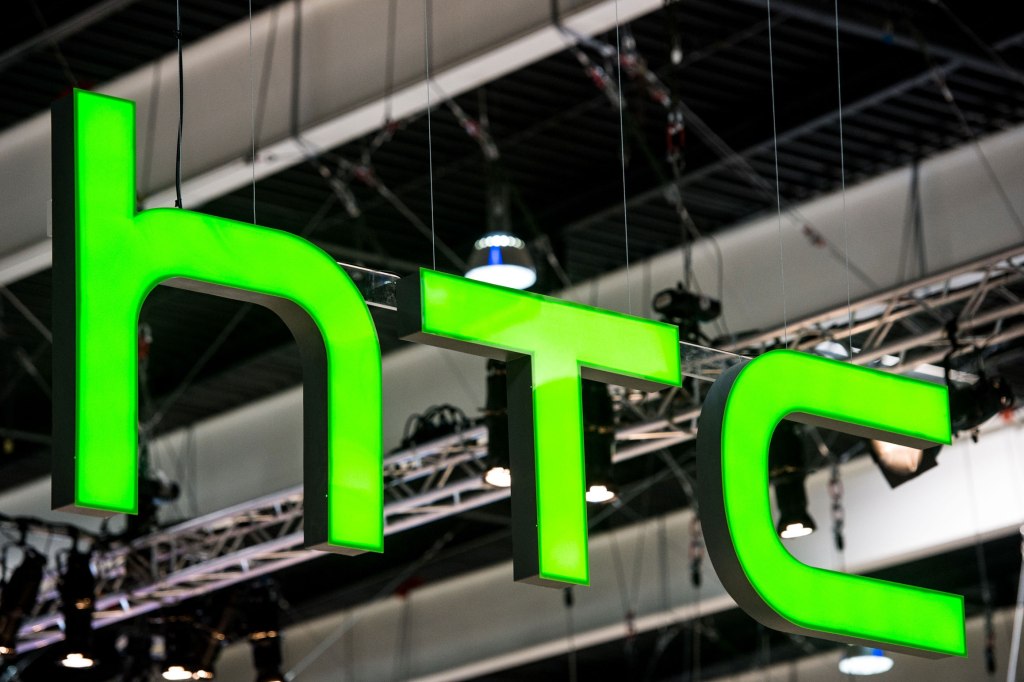On September 17, HTC announced that cofounder Cher Wang would be stepping down as CEO. In her place, Yves Maitre stepped into the role of Chief Executive, after more than a decade at French telecom giant, Orange.
It’s a tough job at an even tougher time. The move comes on the tail of five consecutive quarterly losses and major layoffs, including a quarter of the company’s staff, which were let go in July of last year.
It’s a far fall for a company that comprised roughly 11 percent of global smartphone sales, some eight years ago. These days, HTC is routinely relegated to the “other” column when these figures are published.
All of this is not to say that the company doesn’t have some interesting irons in the fire. With Vive, HTC has demonstrated its ability to offer a cutting edge VR platform, while Exodus has tapped into an interest in exploring the use of blockchain technologies for mobile devices.
Of course, neither of these examples show any sign of displacing HTC’s once-booming mobile device sales. And this January’s $1.1 billion sale of a significant portion of its hardware division to Google has left many wondering whether it has much gas left in the mobile tank.
With Wang initially scheduled to appear on stage at Disrupt this week, the company ultimately opted to have Maitre sit in on the panel instead. In preparation for the conversation, we sat down with the executive to discuss his new role and future of the struggling Taiwanese hardware company.
5G, XR and the future of the HTC brand
Join 10k+ tech and VC leaders for growth and connections at Disrupt 2025
Netflix, Box, a16z, ElevenLabs, Wayve, Hugging Face, Elad Gil, Vinod Khosla — just some of the 250+ heavy hitters leading 200+ sessions designed to deliver the insights that fuel startup growth and sharpen your edge. Don’t miss the 20th anniversary of TechCrunch, and a chance to learn from the top voices in tech. Grab your ticket before doors open to save up to $444.
Join 10k+ tech and VC leaders for growth and connections at Disrupt 2025
Netflix, Box, a16z, ElevenLabs, Wayve, Hugging Face, Elad Gil, Vinod Khosla — just some of the 250+ heavy hitters leading 200+ sessions designed to deliver the insights that fuel startup growth and sharpen your edge. Don’t miss a chance to learn from the top voices in tech. Grab your ticket before doors open to save up to $444.

Brian Heater: Why was this something that you decided to take? Why did it seem like a good fit?
Yves Maitre: That’s a really good question. I was an executive at Orange, and you can imagine life as an executive at AT&T or Verizon. These are fabulous companies. They are very strong, they are very solid, they are very robust, but they are big boats.
And at a certain point in time, I was asking myself the question, should I continue on such a big boat with a lot inertia? Or should I jump into a smaller boat? So where life may be a little bit more difficult, but more sexy in a sense, more fun, more creative, more space, more speed, and more fun at the end of the day.
Heater: It’s been a rough few years for the company. Why do you feel that HTC is in a good position to help take networking, 5G mobile phones and VR to that next level?
Maitre: I agree in a sense of what you’re saying and I may challenge a little bit of what you’re saying. If you look at the HTC brand or Vive brand, those brands are very, very solid. It’s still emotional when you talk to people in the street. They say, “What do you think about HTC?” They all say, “Oh, yes, I remember. It was one of my first phones or it was the first phone of my mom,” or something like that.
Heater: Nostalgia and the strength of the brand right now are not necessarily the same.
Maitre: The brand is very clean. There is no issue with this brand. This brand has a brand awareness which is still very, very high. It is an asset of a company to have a brand that is a consumer brand as well as a B2B brand, which is absolutely clean.
Believe me, there are a lot of brands who would really, really love to be as valuable as HTC. Yes, we need to revive the brand a little bit. Yes, I’m sure there is a lot of work to be done around the brand. But as a French citizen, I may say that we have this brand culture in France.
All of those big brands that we have in France like Chanel, like Louis Vuitton, all these things. So I’m pleased to have a brand that is still very vivid and where we have to clean a little bit, and we have to remind people of what it means to be an HTC partner.
There is a lot of ethics also behind this type of brand because when we are creating a new word like virtual reality, we have a strong responsibility in terms of ethic towards all this generation, which is starting in this world with these new objects. We all know that it has already had a very strong impact regarding the way people are looking at life, the way people are looking at freedom, the way people are looking at being tracked every day through cameras, through everything.
Heater: Roughly what kind of timeframe are you looking at?
Maitre: Those types of discussion I will have to manage with the board first. There may be several options and those are internal discussions that I have to raise to the board. I’m starting my 11th day today, so I have 10 days [under my belt]. It’s my 11th day.
And there are a lot of things that I already have in mind, but I need to put that very clearly in terms of a strategy and in terms of the company. I will give several options to the board, and then probably the board will discuss and decide one of them or they may ask me to rework something. And hopefully very soon, I will have the board giving me the green light, and then I will be able to implement and to communicate accordingly.
The smartphone strategy and blockchain
Heater: We tend to think of the legacy that the company has in mobile phones and smartphones. Obviously the Vive has been a more and more important piece of that puzzle.
What do you see the breakdown being going forward, in terms of the resources allocated? Does the smartphone piece of the puzzle remain the most important priority for the company?
Maitre: I mean again, behind your question there are several questions. One clearly being will HTC stop the smartphone? Yes or not? Again, as you can imagine, this is a very important strategic decision.
For the moment, I mean the smartphone is a significant part of our revenue. We do believe that the smartphone has a role to play in virtual reality. We are investing in blockchain smartphones. So the main key question is not, do we have to stop the smartphone or not.
This is big business, yes, with the smartphone, and there is big potential to come with a smartphone. There are a lot of rumors regarding augmented reality, for instance, for Apple. And our strategy is XR, not only VR. So at this stage, the question of stopping the smartphone and to say HTC will not be the smartphone provider anymore is not on the table. Clearly.

Heater: I get the impression that OEM-ing and that working with manufacturers to provide designs, IP, manufacturing, that’s going to take on perhaps an even more significant role for the company going forward.
Maitre: I believe that the smartphone market is big. There is a lot of money to be made. There is a lot of innovation to be coming in the next few years, 5G being one of them.
You know that we have a very strong relationship with 5G. Our 5G modem has been already validated by more than 10 big carriers like Sprint, for instance, like Orange, like Deutsche Telekom, T-Mobile in Germany. You will have more and more brands, including in the US, coming, which demonstrates very clearly that we have still a very strong presence to our carriers.
And you know that carriers are driving a lot. They are driving 5G, but they’re also driving, a big part of the smartphone.
And yes, you’re absolutely correct. We need to reassess the way we want to enter and want to penetrate this market again, and how to position ourselves, what we really want to do, and which partner we have to play. Because I’m a strong believer that it’s very difficult now to be successful in the 5G world if you’re working alone, vertically, and not in an open way.
So we will have to partner with some big players, with some small players, with our customers, with carriers. And yes, very clearly we have to leverage manufacturing scale that may be in China, and yes, we probably have to manage our manufacturing plan to do something different which is heavier, which is more tailor-made, which is more, in terms of innovation quality, leading-edge and where the big volume and mass market is not our strength in terms of manufacturing.
Heater: What role [will blockchain] play in the future and what kind of timeline potentially we’re looking at for it to go from this niche curiosity to a real mainstream mobile phone technology?
Maitre: The blockchain is, as you mentioned, a niche market today. Will blockchain be one of the key stories in the next two to three years? I don’t believe it. We can see that there are a lot of regulatory issues and we should not underestimate those regulatory issues.
You should ask our friends and colleagues from Facebook and Oculus, which are also trying to build this new word. In a sense we are competitors, but in a sense, we are peers trying to look forward and trying to be innovative. And really, I think it’s very funny to see that Facebook and HTC both have their own assets and different angles and perspectives.
We all think about crypto money. We all think about virtual reality. We all think about how we will build this new world. And we know that building a new world, which is the virtual or XR word, means not only technology but means how customers will accept it. Customer acceptance.
How the real world will accept it, and that’s the regulatory story. And those types of things take time because we are touching the foundation of our world, and we have to cope with it, and we have to test this idea. This is a very important game that some of the main key players, HTC is one of them, are playing.
It’s not only entertainment, it’s not only fun, it’s not only a joke. We are building something fundamentally different and we have to be cautious. So yes, I mean the blockchain is part of the vision. It’s obviously also part of the vision with crypto money for Facebook, and we absolutely align on that one.
I think we share the same view, and it will take time. We have to go at the right speed. We have to listen to our customers, we have to listen to state government regulators, but it doesn’t mean that we should not try. I mean we try and we discuss, and we change, and we put patents, and we create assets, and we explain to our customers what we want to do, and we are learning from our customers what we should do better.
Competing in the enterprise vs consumer
Heater: When it comes to being really competitive, does it make more sense for HTC to compete in the enterprise space versus consumer where you’re competing for what is, at the moment, a relatively small audience, and you’re doing it against such a behemoth with so many resources like Facebook?
Maitre: We have a belief, we have a credo. A credo is a belief in English. I prefer to put it in the Latin way because it’s more than a belief. So we have a credo. And this credo is 5G and XR.
XR we have been talking about. 5G we just started to feel it in the new world because carriers are just starting to deploy it. But obviously, when you talk to carriers, when you talk to everybody, including Ericsson and Nokia and Huawei, who are the ones making the infrastructure, everybody is aligned regarding the fact that the 5G will change productivity for the enterprise. And that the enterprise sector will have a new revolution because of connectivity, because of this type of ubiquity of connectivity and what we are talking about.
And if we believe in our credo, 5G and XR, knowing that 5G will be B2B, obviously we have to have to go B2B because that’s part of our credo. It’s part of our DNA. And with our DNA being 5G and XR, we will follow our DNA and we’ll continue to serve our B2C customers.
But those who are embracing the 5G at a larger scale, which is the enterprise, we’ll have to continue to serve them because that’s our vision. If you look at from 2019 to 2023 or 2024, the number of data that will be used worldwide will be multiplied by ten. 10 times more in five years.
But the most important thing is not that it’s 10 times more. It’s that today, consumers are using 70 percent of the data, on the bandwidth, on the data number, I mean on terabytes. 70 percent of our consumers are mostly video. And 30 percent by enterprise. In five to 10 years, it will be reversed.
70 percent or more will be used by enterprise for many reasons, and 30 percent to 20 percent by consumers. So this is a shift, and this shift is clearly driven by technology and by 5G. And since 5G is part of our credo with XR, we will have to follow the river. We have to follow the wind, we have to follow the trend. And yes, we are clearly going towards that direction because that’s what’s our customer are asking for.

